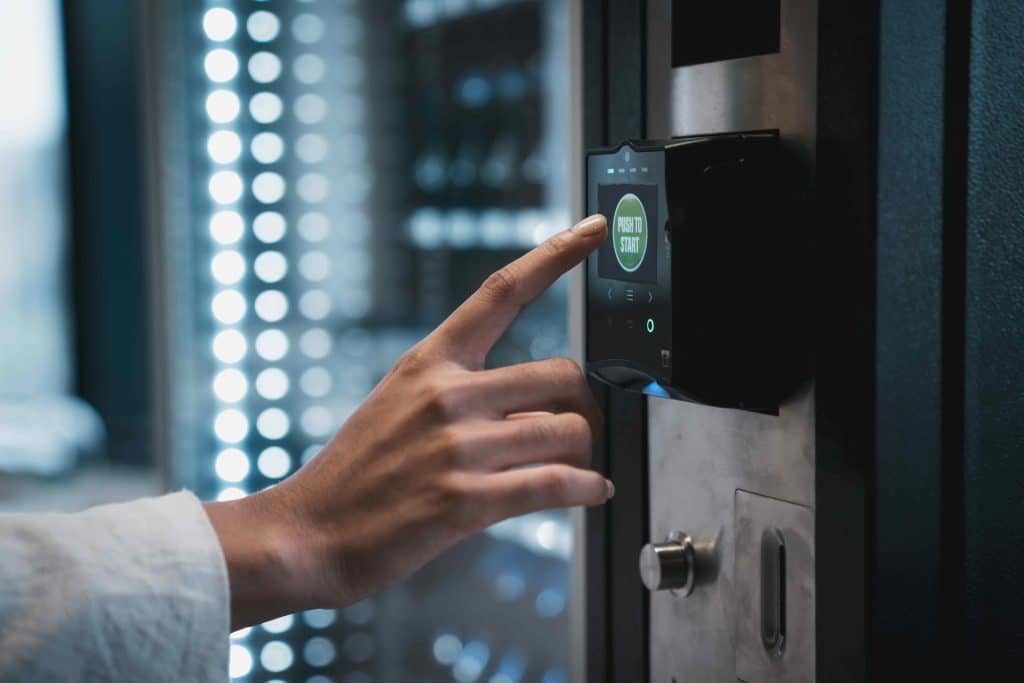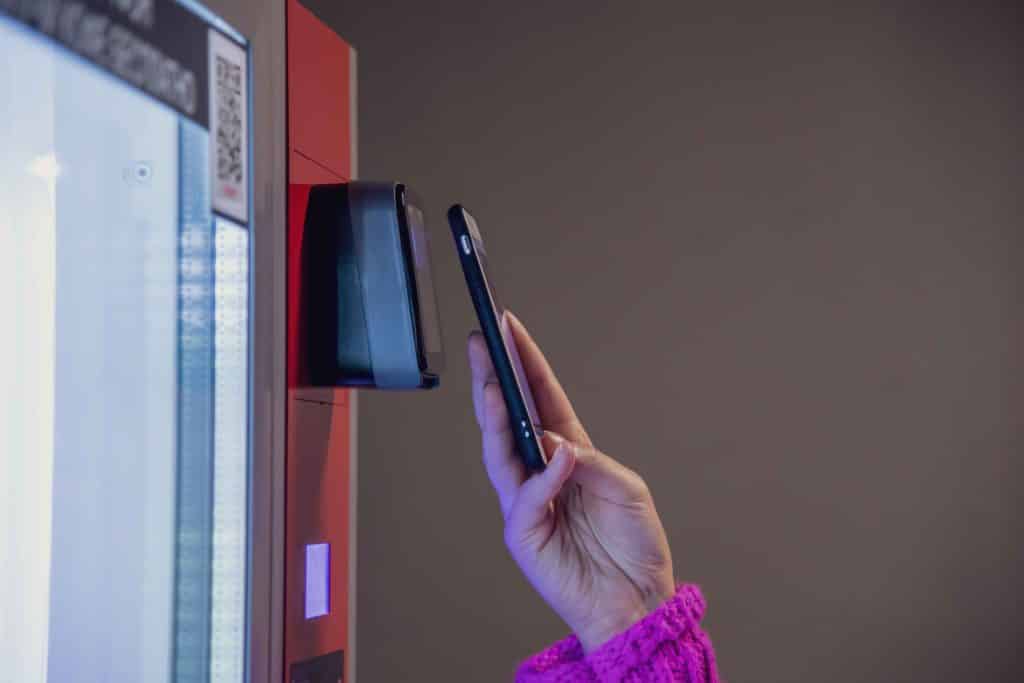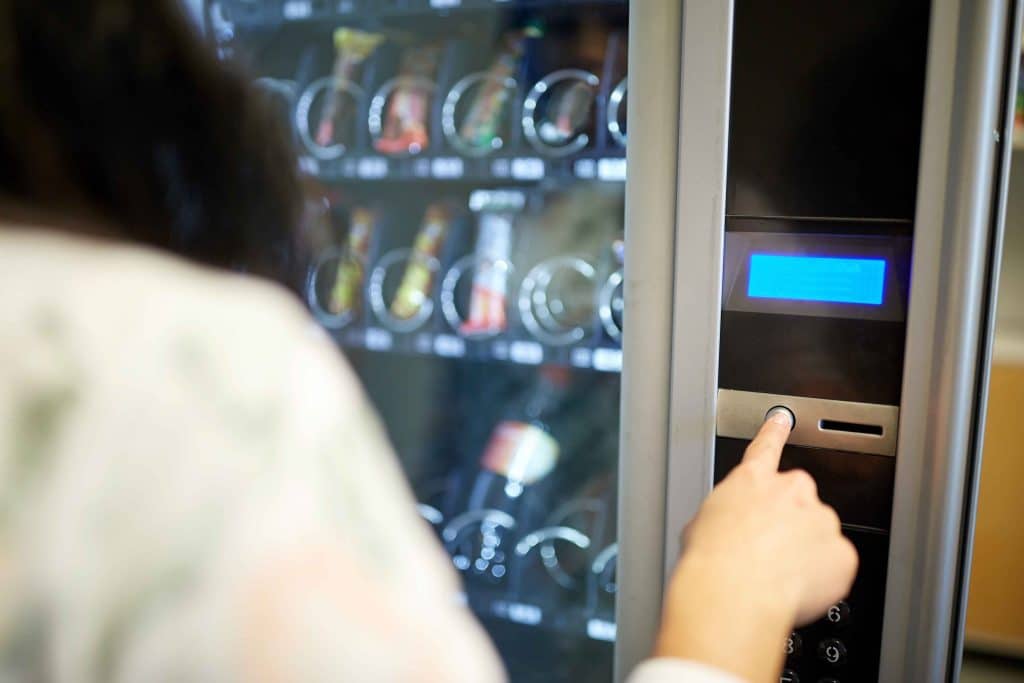As we explore the theory of smart vending technology ousting the traditional vending machine key, it’s clear that we’re not just discussing a hardware change. This shift signifies a broader evolution in retail automation, where physical keys are being replaced by digital access codes, biometrics, or mobile app-based mechanisms. It’s a fascinating transformation, but does it truly unlock greater efficiency in vending operations? Hold that thought, as we’re about to dissect the pros and cons of this modern tech’s impact on the vending industry.
Get Free Consultation
Key Takeaways
- Smart vending technology replaces physical keys with digital controls, enhancing security and operational efficiency.
- Biometric authentication and encryption algorithms play a crucial role in securing digital keys and preventing unauthorized access.
- Card readers and cashless transactions in smart vending machines not only improve security but also efficiency and user experience.
- Future trends in smart vending machines include AI-based predictive access monitoring and energy efficiency, ensuring sustainability and relevance in the digital age.
Read more about our Smart Vending Solutions!
The Legacy of the Vending Machine Key in Retail Automation
The journey of vending machine keys from physical locks to digital control has revolutionized retail automation. Various types of these keys and their uses have played a crucial role in this evolution. However, the limitations of traditional keys in the era of modern smart vending machines have become increasingly apparent.
From Physical Locks to Digital Control
Transitioning from traditional physical locks to advanced digital control systems, vending machines have significantly evolved in the realm of retail automation. The shift has been marked by the increasing obsolescence of the conventional vending machine key, replaced by smart vending tech like card readers and superior vending machine software. The following are key markers of this transition:
- The advent of the smart vending machine, which leverages digital controls for enhanced security and efficiency.
- The proliferation of the vending machine with card reader, offering cashless transactions and tracking capabilities.
- The rise in vending machine for sale, particularly mini vending machine units, reflecting their reduced price due to advancements in smart vending technology.
This evolution signifies a dynamic shift in retail automation, driven by evolving consumer needs and technological innovation.

Common Types of Vending Machine Keys and Their Uses
Despite their fading prominence, vending machine keys once played a crucial role in retail automation, with different types serving various functions. Flat keys, commonly used in older machines, offered a simple, one-size-fits-all solution.
However, they lacked advanced security features. Tubular keys, featuring a circular design, provided better protection against picking but were more expensive. Laser cut keys, with their unique, intricate cuts, delivered higher security levels, but at a cost.
Crucially, each key type served a dual role: enabling access for restocking and securing the machine against unauthorized access or theft. Understanding these keys helps appreciate the evolution of vending machine tech. As smart technology advances, these keys’ limitations become more apparent, paving the way for digital solutions.
Limitations of Traditional Keys in Modern Smart Vending
As we venture into the era of smart vending, traditional keys reveal their limitations, struggling to keep pace with the digital revolution in retail automation. They lack the ability to adapt to the growing needs of the industry, proving to be more of a hindrance than a help.
The shortcomings of traditional keys lie mainly in three areas:
- Security: With no trackability or user identification, they pose a significant security risk.
- Flexibility: They can’t provide different access levels, unlike their digital counterparts.
- Efficiency: Their use can lead to operational inefficiencies and increased costs, especially in large-scale operations.
Traditional keys, once central to vending operations, are now losing relevance, making way for more efficient, secure, and adaptable smart vending technologies.
How Smart Vending Technology is Replacing Traditional Keys
Smart vending technology is ushering in a new era, making traditional keys obsolete in the vending machine industry. By integrating access control, these machines are enhancing security and simplifying remote access management. This shift not only improves security but also revolutionizes the overall operation of vending machines.
Access Control in Smart Vending Machines
Traditional vending machine keys are becoming a thing of the past, with innovative smart technology stepping in to enhance access control. This technology allows for a more secure and efficient operation, eliminating the need for physical keys and the risk of loss or theft.
Smart vending machines utilize advanced authentication methods for access control:
- Biometric Authentication: This includes fingerprint scanning or facial recognition, ensuring only designated personnel can access the vending machine.
- Digital Keys: These are unique codes transmitted via smartphones or other devices, replacing traditional metal keys.
- RFID Cards: These cards allow contactless access to the vending machine, providing an extra layer of security and convenience.
With these advancements, the vending machine industry is moving towards a more secure and efficient future.
Smart Vending Software for Remote Access Management
Transitioning to smart vending technology, operators are now managing access remotely, thus phasing out the need for traditional keys. This shift has streamlined operations and increased efficiency. Instead of juggling multiple keys for different machines, operators can now control access through an app or online platform.
To better understand, let’s compare the traditional and smart vending management:
| Traditional Vending | Smart Vending |
| Physical keys needed | No physical keys |
| In-person access required | Remote access |
| Time-consuming | Time-efficient |
| Limited security | Enhanced security |
| Prone to human error | Reduced errors |
Smart vending technology isn’t just replacing keys; it’s transforming the vending industry. By leveraging the power of technology, operators can manage machines more effectively, leading to improved efficiency and profitability.
Security Upgrades Beyond the Vending Machine Key
As technology advances, the shift from the traditional vending machine key to smart vending technology is enhancing security measures in the industry. This new tech offers improved security options, making vending operations more efficient and reliable.
Smart vending technology has revolutionized the industry by introducing:
- Biometrics: This allows for facial recognition or fingerprint scanning, ensuring only authorized personnel can access the machine.
- Mobile Access: Operators can remotely control machines, eliminating the need for physical keys and reducing security risks.
- Encryption Algorithms: These secure digital keys, making it difficult for hackers to breach the system.
With these upgrades, vending machine operators now have the ability to control and monitor machine access, ensuring a high level of security.

Integrating Card Reader and Cashless Access Features
The integration of card reader and cashless access features into vending machines is a significant step in their evolution. These features enhance both user and operator security, and when paired with digital authentication, they help in reducing theft and downtime. In short, the marriage of smart access and card reader integration promises a safer, more efficient vending experience.
How Card Readers Enhance User & Operator Security
A significant number of vending machine operators now incorporate card readers, significantly enhancing both user and operator security by integrating cashless access features. This not only offers an additional payment option but also reduces the risks associated with handling cash.
In particular, card readers in vending machines provide:
- Data Security: Advanced encryption techniques protect users’ card information, ensuring secure transactions.
- Accountability: Operators can track transactions, aiding in dispute resolution and inventory management.
- Less Cash Handling: Reduces the risk of theft or loss, increasing overall operational efficiency.
Card readers represent a key evolution in vending machine technology, providing secure, efficient, and user-friendly payment options. As technology continues to evolve, these features undoubtedly enhance the vending experience for both users and operators.
Pairing Vending Machine Keys with Digital Authentication
While traditional vending machine keys have their merits, it’s becoming increasingly common to pair them with digital authentication to further enhance security and convenience. This integration is a leap towards smart vending, merging physical and digital security features. It’s seen as a way to streamline operations while maintaining the highest security standards.
The pair-up allows for real-time monitoring, offering operators an insight into the usage and maintenance requirements. It also includes cashless access features, eliminating the need for physical money. Users can make purchases using their credit or debit cards, or even mobile payments. This digital transformation doesn’t just improve the user experience, but it’s also an effective method to combat unauthorized access and potential theft. It’s a win-win situation for both operators and customers.
Reducing Theft and Downtime with Smart Access + Card Reader Integration
Integrating smart access with card reader technology, vending machines now operate more securely and efficiently, significantly reducing instances of theft and downtime. This evolution in vending tech has provided businesses with several benefits.
- Increased Security: Card reader technology allows for secure transactions, reducing the likelihood of theft. It’s a safer alternative to traditional cash transactions.
- Reduced Downtime: Smart access prevents unauthorized use, leading to less machine downtime. This ensures a consistent income stream for vending business owners.
- Enhanced Customer Experience: The integration of these technologies provides a seamless and fast transaction experience, adding to overall customer satisfaction.
In essence, the evolution of vending machine keys towards smart access and card reader integration has revolutionized the vending industry, raising both security and efficiency.
Cost, Scalability, and Choosing the Right Smart Access Solution
When considering the shift from traditional keys to smart access solutions for vending machines, the cost implications and scalability of these advancements become key factors. One needs to examine the real expense involved in implementing such a system, keeping in mind the accessibility requirements of different machine sizes. Finally, to make the most informed decision, the return on investment between traditional and smart access vending machines should be thoroughly evaluated.
What’s the Real Cost of a Smart Vending Machine with Advanced Access?
Understanding the real cost of a smart vending machine with advanced access requires a careful analysis of factors like upfront costs, scalability potential, and choosing the right smart access solution. It’s not just about the initial investment, but the ongoing costs and potential returns as well.
- Upfront Costs: This includes the cost of the machine itself, installation, and integration with existing systems.
- Scalability: One must consider the cost implications of expanding the number of machines or upgrading existing ones.
- Smart Access Solutions: Choosing the right solution is crucial. The cost can vary significantly depending on the technology used and its compatibility with the machine.
Understanding these factors can help businesses make informed decisions about investing in smart vending technology.
Mini Vending Machines and Their Access Requirements
Mini vending machines, despite their compact size, have unique access requirements that directly impact cost, scalability, and the choice of smart access solution. These machines need to offer high security yet be easily accessible for refilling and maintenance. This balance is key in determining the overall cost and scalability of these vending solutions.
| Access Requirement | Impact on Cost | Impact on Scalability |
| High Security | Increased cost | May limit scalability |
| Easy Refilling | Reduced cost | Enhances scalability |
| Maintenance | Variable cost | Depends on solution |
| Smart Access Solution | Initial high cost | Potential large scalability |
Choosing the right smart access solution requires careful evaluation of these factors. It’s not just about the cost, but also how the solution can enhance the machine’s functionality and scalability.
Evaluating ROI: Traditional Key vs. Smart Access Vending Machine for Sale
To assess the return on investment, comparing traditional key vending machines against their smart access counterparts is an insightful exercise, considering elements such as cost, scalability, and the selection of an appropriate smart access solution. Traditional vending machines are generally cheaper but lack scalability. On the other hand, smart access vending machines offer scalability, but require a higher initial investment.
Factors to consider when evaluating ROI include:
- Cost: Smart vending machines may have higher upfront costs but can lead to long-term savings through efficiency and reduced maintenance.
- Scalability: Smart vending machines can be easily scaled up or down, offering flexibility in response to demand.
- Solution selection: Choosing the right smart access solution requires careful consideration of a vendor’s reliability, security features, and customer support.
Future-Proofing Access: What’s Next After the Vending Machine Key?
As technology advances, the traditional vending machine key may become a relic of the past. Emerging trends point towards biometrics, AI, and mobile unlocking as the next frontier in vending machine access. Balancing this with sustainability and security concerns poses an intriguing challenge for the industry.
Biometrics, AI, and Mobile Unlocking in Vending Software
In the evolving world of vending machine technology, biometrics, artificial intelligence, and mobile unlocking are reshaping the traditional use of keys for access and security. These advanced systems offer more reliable and secure alternatives to physical keys. They eliminate the need for key duplication and the risk of keys getting lost or stolen.
- Biometrics: Through fingerprint or facial recognition, only authorized personnel can access the vending machine, enhancing security.
- AI: Artificial intelligence can manage access control, limiting access based on user profiles and timeframes.
- Mobile Unlocking: With a mobile app, users can unlock vending machines remotely, reducing the need for physical keys.
These technologies are not only modernizing vending machine operations, but also paving the way for future advancements in vending software.

Vending Machine Software with AI-Based Predictive Access Monitoring
Moving beyond traditional vending machine keys, AI-based predictive access monitoring is becoming the new standard in vending machine software. This shift signifies a significant leap in vending technology, ensuring more secure and efficient operations. Advanced algorithms analyze usage patterns, predicting when access will be required.
This anticipatory approach reduces unauthorized access and ensures timely restocking. Additionally, the software can alert operators to irregular access patterns, highlighting potential security risks. This predictive model, while still in its early stages, is expected to revolutionize the vending industry, making it more reliable and customer-friendly.
While traditional keys may never completely disappear, their role is certainly being redefined by the advent of smart vending technology. AI-based predictive access monitoring is thus paving the way for the future of vending machine access.
Sustainability and Security: The Smart Vending Access Balance
While smart vending technology is reshaping access with AI-based predictive monitoring, it’s also striking a balance between sustainability and security, future-proofing the industry beyond traditional vending machine keys. These advancements not only revolutionize access but also bring about a new level of efficiency, safety, and eco-friendliness.
- Sustainability: Smart vending machines promote energy efficiency and minimize waste, contributing to a greener planet.
- Security: Advanced access controls, AI monitoring, and encrypted data transmissions increase the machines’ security, reducing the risk of theft and vandalism.
- Future-Proofing: These cutting-edge technologies ensure that vending machines remain relevant and efficient in the ever-evolving digital landscape, far outlasting the dated key-based access systems.
Protect your vending technology from cyber threats. Read more!
Conclusion
While some may argue that traditional vending machine keys are simpler to use, the evolution to smart vending technology is undeniable. Not only does it offer enhanced security, but it also allows for scalability and cost-efficiency. With features like card readers and cashless access, the humble vending machine key is becoming a thing of the past. As technology continues to evolve, so will access solutions, keeping the vending industry future-proof and thriving.
Vending Solutions
With our smart vending solutions, grab-and-go shopping gets simpler, faster, and more personalized.
Frequently Asked Questions
What is a vending machine key, and why is it becoming obsolete?
A vending machine key is a physical tool used to unlock traditional vending machines for refilling or maintenance. However, with the rise of smart vending technology, businesses are replacing these keys with digital solutions like mobile access, RFID cards, and biometric authentication for improved security and operational efficiency.
How does smart vending tech improve security compared to traditional vending machine keys?
Smart vending tech eliminates the risks of lost or duplicated physical keys. It introduces encrypted digital access, real-time user tracking, and remote access management through vending machine software, making it significantly harder for unauthorized users to gain entry.
Can vending machines with card readers still use traditional keys?
While vending machines with card readers may still have physical key access, most modern setups pair card readers with smart vending software to reduce or eliminate key dependence. This hybrid approach enhances both transaction security and operational control.
Are mini vending machines compatible with smart access systems?
Yes, even mini vending machines can be outfitted with smart vending machine technology. Operators can integrate features like mobile unlocking, inventory tracking, and remote access—offering the same efficiency and security benefits as larger units.
What should I consider when evaluating vending machine price for smart access features?
When comparing vending machine price points, factor in long-term savings from reduced downtime, theft prevention, and labor efficiency. Smart vending machines may have a higher upfront cost, but the ROI often outweighs that of traditional vending machines for sale with only mechanical keys.

